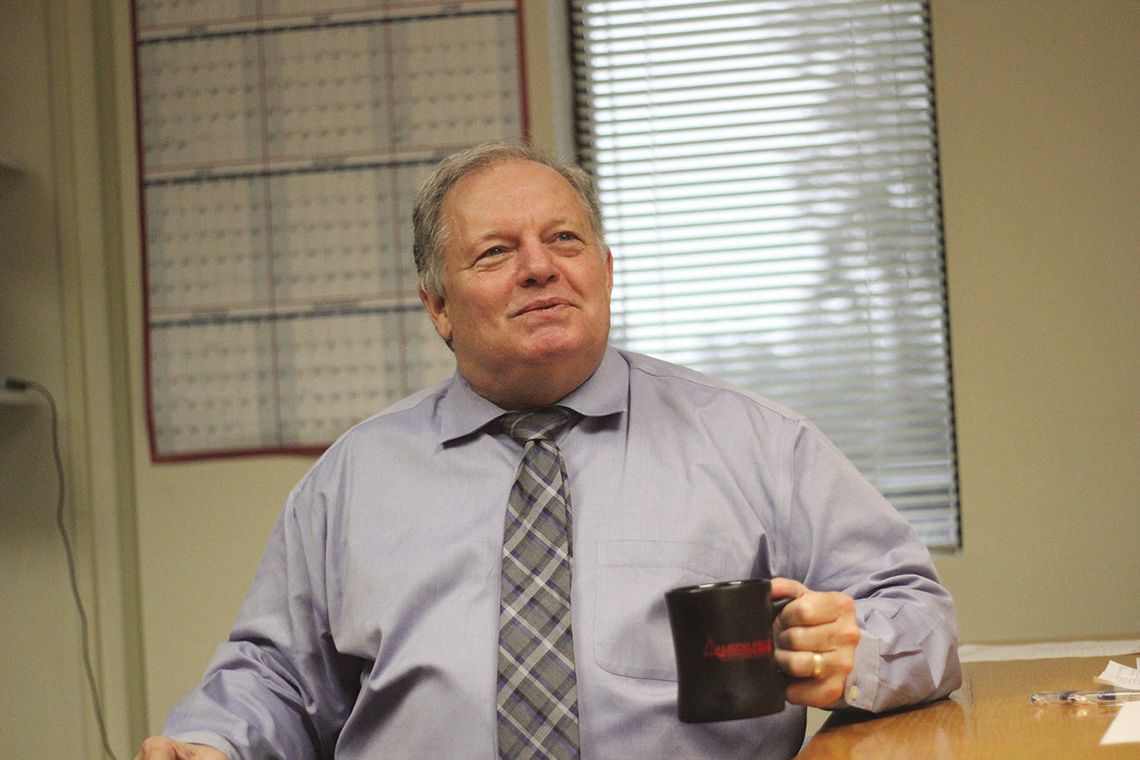Superior Court judge since 2011, attorney since 1984
NEWPORT – Pend Oreille County Superior Court Judge Pat Monasmith once jailed a Stevens County commissioner for contempt of court.
“He walked out on me,” Monasmith remembers in an interview with The Miner last week. He had the commissioner brought back to court from a local coffee shop. “They drug him back in and I said, ‘look, you can’t walk out on me like that. Now are you going to cooperate or not?’
“He started talking to his friends in the back of the courtroom and was clearly not going to cooperate with me, so I had him taken downstairs for the weekend,” Monasmith says, referring to the Stevens County jail in the basement of the courthouse.
That was before he became a Ferry/ Pend Oreille/Stevens county Superior Court Judge. He was acting as a temporary Stevens County District Court Judge, a judge pro-tem. Monasmith recently wrapped up a legal career in which he practiced law for decades, then went on to be a Superior Court judge for more than 14 years.
Most of Monasmith’s cases weren’t so dramatic, although he has presided over consequential trials, both civil and criminal. He once sentenced a man to more than 120 years in prison for stealing guns, burglary and other offenses. The man was convicted in a jury trial of burglarizing a home and stealing several firearms, one of which was later used in a murder.
Since the man was a felon and prohibited from possessing guns, under Washington’s ‘Hard Time for Armed Crime’ statute, the gun thefts and illegal possession of firearm sentences had to be served consecutively. Monasmith sentenced the man to the minimum for the gun charges, but that still resulted in a 12-decade sentence.
The case, like most criminal convictions, was appealed. It was upheld.
Monasmith says since he had already been involved in trials as an attorney, he didn’t find it hard being a judge in his first couple trials.
“I just remember those first few trials as having butterflies,” he says, “hoping you can do well and don’t embarrass yourself. After a few of them it becomes pretty routine.”
Difference in listening as judge
Monasmith says there is a marked difference in how he listens in court as a judge compared to how he listened as an attorney.
“When you listen as a lawyer, you’re listening competitively,” he says, listening for mistakes from the other side that you can take advantage of for the benefit of your client. “When you’re listening as a judge, you’re listening for what makes sense, what is most consistent to what we understand life to be. And then applying the law as you know it.”
Monasmith comes from a family of educators. Both his parents were teachers and the family moved from place to place following their careers. He ended up in Colville, where he graduated from high school in 1977. He enjoyed playing sports – football and baseball, as well as golf.
He was good enough at golf to be a fouryear letterman for the University of Idaho’s golf team. After graduating the U of I with an English degree, he went to the school of law, where he got his law degree.
Law’s changed during time on bench
He has seen several changes since he was appointed to the bench in 2011.
Non parental custody, civil protection orders and juvenile law have all changed.
In juvenile cases, such as truancy, detention at Martin Hall isn’t an option anymore. “You can order them to do community service,” he says. But if the child doesn’t comply, judges can’t order detention.
“It’s quite frustrating from a judge perspective,” he says. “If this is social work, then maybe they need to be in front of a social worker, not the judge, because we really don’t have the authority.”
Even for juveniles accused, even convicted, of a criminal offense, detention isn’t really an option anymore. The current thinking is not to jail juvenile offenders, he says. The other trend is to extend jurisdiction for juvenile offenders to 21.
He says the brain science shows that a male’s brain isn’t fully developed until age 25. As a result, many young murderers who were sentenced to life imprisonment are being resentenced.
Monasmith says there are far more people seeking civil protection orders because of changes in law. Judges used to be able to dismiss civil protection orders if there was another legal remedy available. The law changed and people can seek protection orders even if there is another remedy available.
The law around non parental custody has completely changed, Monasmith says. He says he’s not sure it’s any better, but it does require judges learn a new way of doing things.
Most people glad they served on a jury
Monasmith says one thing that hasn’t changed much is jurors. He says many people say they don’t want to serve on juries, but his experience is that most are glad they served.
He gives the example of a man who said he hated the government and was still placed on the jury of a guardianship trial. Monasmith went back and spoke with jurors following the jury’s decision. The antigovernment juror said it was a positive experience.
“He said, ‘I just want to let you know, judge, that I really enjoyed that experience. I never thought I would, and I really did,’” Monasmith says.
Monasmith says he hadn’t given much thought to being a judge, although he had served a Stevens County Superior Court commissioner from 2007-2009. In about 2006, Monasmith, who lives in Chewelah, was approached by other judges who asked him to consider being a judge.
In 2010, Monasmith resigned as Superior Court commissioner so that he could run for prosecutor. Most judges then were appointed at first. He thought demonstrating that he could run a political campaign was necessary to be appointed judge, so he ran for Stevens County Prosecutor. He lost what he called a “bruising” election and returned to private practice.
Appointed as judge 2011
When tri county Superior Court Judge Rebbecca Baker announced she was retiring in late 2011, he applied. He went through a several-month-long appointment process. He was one of two candidates who interviewed with Democratic Gov. Christine Gregoire and was appointed Superior Court Judge, later twice being elected.
Monasmith says being a Ferry/Pend Oreille/Stevens county Superior Court Judge has been satisfying. Superior Court is a court of general jurisdiction, meaning a wide variety of cases ranging from medical malpractice to criminal cases, to trusts and estates to divorces are heard in Superior Court.
“Between the breadth of what you do and the fact that you drive to get to where the people are instead of the people coming to you, that’s what makes this a super interesting job,” he says. “It’s been a real pleasure.”
.png)







